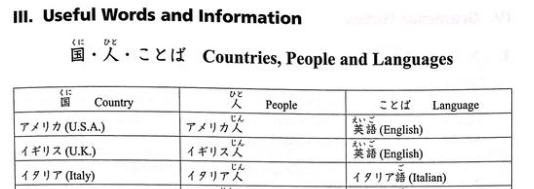In addition to tarkma's and BJCUAI's answers, I'd like to draw your attention to the header:
国【くに】・人【ひと】・ことば
All three of these are so-called 大和【やまと】言葉【ことば】, or native-Japanese terms, which are read with the 訓読【くんよ】み. The word 言語【げんご】, meanwhile, is read with the 音読【おんよ】み, and originates as a borrowing from Chinese. For a consistently 音読【おんよ】み header of the same meaning, we could say instead:
国家【こっか】・国民【こくみん】・言語【げんご】
However, this comes across very differently.
The terms native to the language have a more informal, familiar, and comfortable sense, while the terms borrowed from Chinese tend to be more formal, academic, and sometimes stilted. This is similar in some ways to English vocabulary, where words native to English are more informal, familiar, and comfortable, while the terms borrowed from Latin tend to be more formal, academic, and sometimes stilted.

